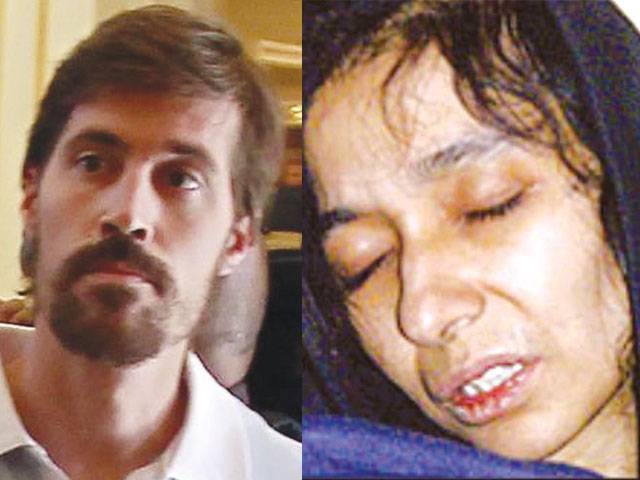NEW YORK - ISIS militants reportedly demanded the release of Dr Aafia Siddiqui, a Pakistani neuroscientist and others extradited to the United States, in exchange for American journalist James Foley and other Western hostages, according to media reports.
In an email sent to Foley’s family, the militants claimed they had offered “prisoner exchanges to free the Muslims currently in your detention” including Dr Sidiqqui.
Dr Sidiqqui, 42, who was educated at the Massachusetts Institute of Technology, was arrested in Ghazni, Afghanistan in 2008. She was subsequently sentenced to 86 years in prison after being convicted of attempting to kill US military personnel, sparking protests across Pakistan demanding her release. A petition to the White House also calling for her release has gathered 110,000 signatures in August. She is being held at a prison in Texas.
ISIS letter claimed that despite its offering prisoner exchanges to free those currently in US detention like Dr Afia Sidiqqi, the government “proved very quickly that this is NOT what you are interested in”.
The GlobalPost said Foley’s family received their first message from his captors on 26 November 2013, asking for money, “fast,” after more than a year without contact.
“After the militants had proved to the Foleys and investigators that they were in fact holding Jim, they made their sole demand for a ransom of 100 million euros (about $132 million) or the release of unspecified prisoners held by the United States,” the news-site said.
But President Barack Obama’s administration point blank refused to consider releasing Siddiqui, or handing over a $132 million ransom, The New York reported.
In the video released by Isis showing Mr Foley’s killing, a militant believed to be British also threatened the life of another journalist Steven Sotloff.
The man who killed Foley, who speaks with a British accent, addressed the US President, saying: “The life of this American citizen, Obama, depends on your next decision.”
AFP adds: James Foley’s jihadist captors sent his family a taunting and rambling email threatening to kill him, just a week before making public a video of his execution, the American reporter’s employer said Thursday. GlobalPost said it released the full text of the email from Islamic State (IS) militants “in the interest of transparency and to fully tell Jim’s story.”
“We believe the text offers insight into the motivations and tactics of the Islamic State,” it added.
Isis, which has marauded across large areas of Iraq in recent months, on Tuesday published a video showing one of its members beheading Foley. Foley, a photojournalist, was reporting from Syria for GlobalPost and other outlets including AFP when he was abducted in November 2012.
Prior to disclosing the email, GlobalPost CEO Philip Balboni said the captors made contact with GlobalPost and the Foley family fewer than half a dozen times, and “the kidnappers never really negotiated” over their huge sum, but simply made their demand.
“We never took the 100 million (euro) figure seriously,” Balboni told CNN.
The US government opposes paying such ransoms, arguing that it only encourages more hostage-taking.
“We do not make concessions to terrorists. That includes: We do not pay ransoms,” State Department deputy spokeswoman Marie Harf told reporters Thursday.
Such payouts, she added, would only serve to “fund and finance exactly the groups (whose capabilities) we are trying to degrade.” Balboni referred to the release of several European hostages by the extremist group earlier this year, likely upon payment of ransoms that were “dramatically less” than what the group sought for Foley. The family and GlobalPost were seeking to raise money “in the range” of the amount paid for the other hostages, Balboni added, without mentioning a dollar amount.
Harf referenced the other countries’ ransom payments to the group, saying that in 2014 alone, they amounted to millions of dollars, although she too did not provide a figure.
And she stressed that the US government “does not have contact with Isis.”
Balboni said he and the family provided all information about their search for Foley and their contact with his captors to authorities at the FBI and State Department.
After initial messages and the ransom demand, he said, the line of communication with the jihadists went cold until August 13, when they sent the terrifying message telling the Foleys that their son would be killed.
The Pentagon revealed Wednesday that US special forces were sent into Syria earlier this year to try to rescue American hostages but they came up empty-handed as the captives were not at the targeted location. “This operation was a flawless operation, but the hostages were not there,” Defence Secretary Chuck Hagel told reporters.
Friday, November 22, 2024
ISIS offered to swap US journalist for Aafia Siddiqui

Caption: ISIS offered to swap US journalist for Aafia Siddiqui
Two modern waiting areas inaugurated at LGH
November 22, 2024
PPP Foundation Day to be celebrated on 30th
November 22, 2024
LDA seals 182 illegal buildings
November 22, 2024
ICC arrest warrants: What are the legal consequences for Netanyahu and Gallant?
9:30 AM | November 22, 2024
Gaza death toll tops 44,000 as 71 more Palestinians killed in Israel’s genocidal war
9:19 AM | November 22, 2024
-
Hunger crisis to increase in South Sudan, warns UN
-
Hunger crisis to increase in South Sudan, warns UN
-
Pakistan’s judiciary champions climate justice at COP29 in Baku
-
Punjab struggles with persistent smog as Met Office forecast rainfall
-
Punjab residents face escalating smog crisis as pollution levels soar across country
-
Qatar says Hamas 'no longer welcome' in Gulf state
UN Crossroads
November 22, 2024
Smog Trade-off
November 22, 2024
Undersiege Again
November 22, 2024
Land of Vigilantes
November 21, 2024
United in Genocide
November 21, 2024
Proposal to counter increasing cases of harassment
November 22, 2024
Critique of RFE/RL’s Coverage of the SCO Summit
November 22, 2024
Real vs Reel
November 22, 2024
Independent Supreme Court
November 21, 2024
Fat Loss Fantasy
November 21, 2024
ePaper - Nawaiwaqt
Nawaiwaqt Group | Copyright © 2024





